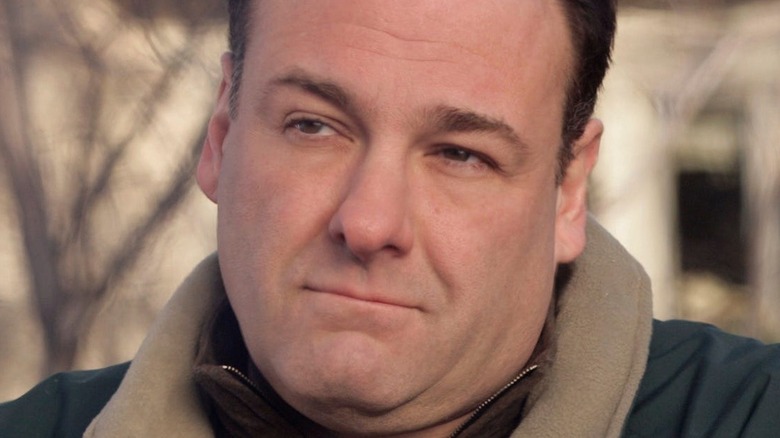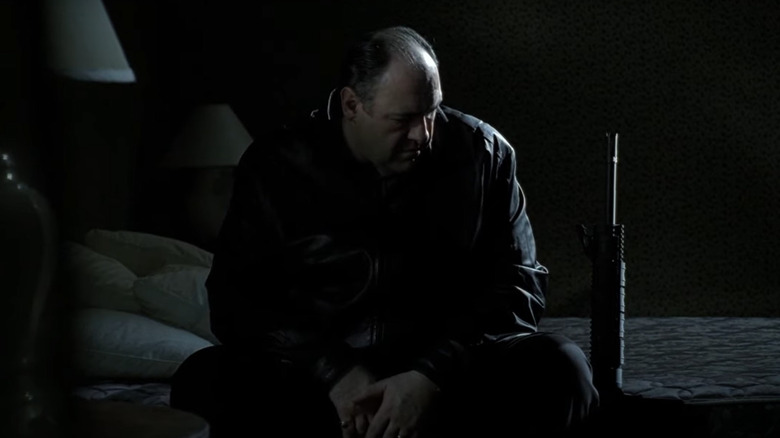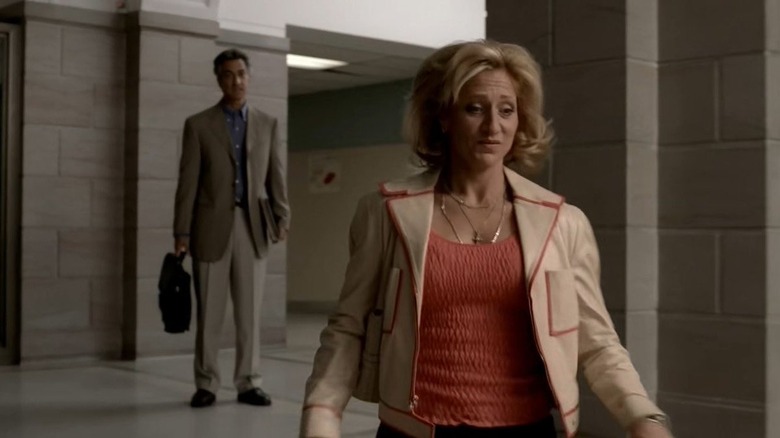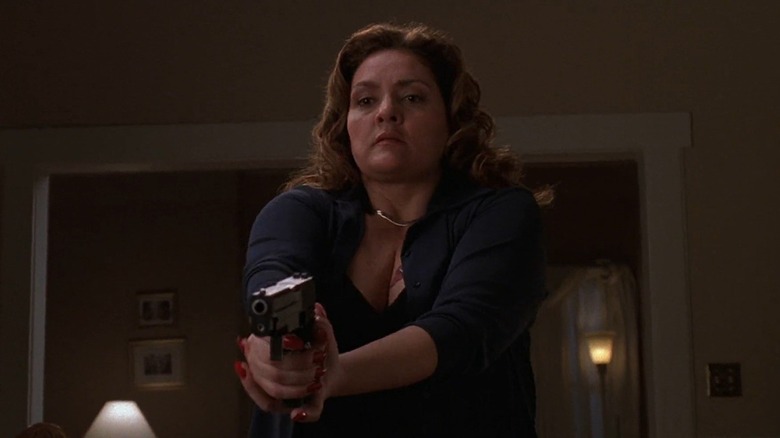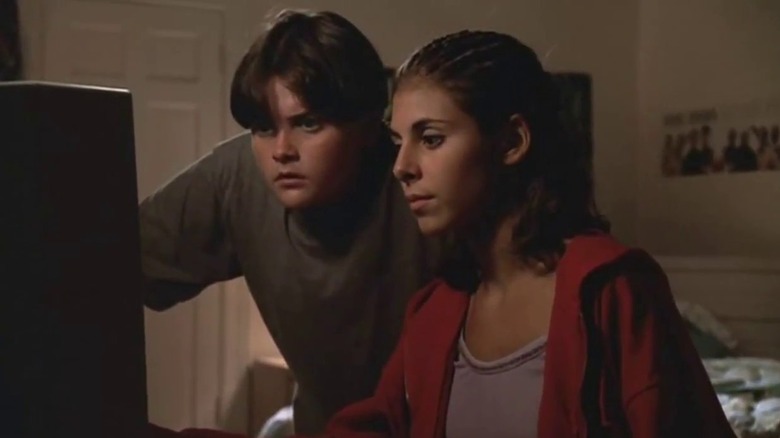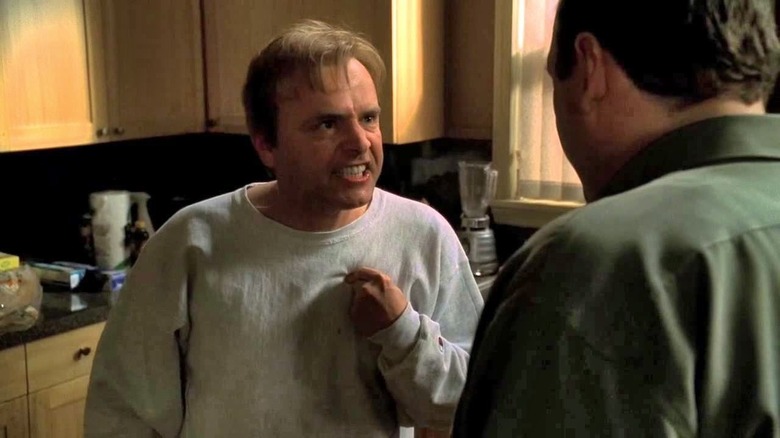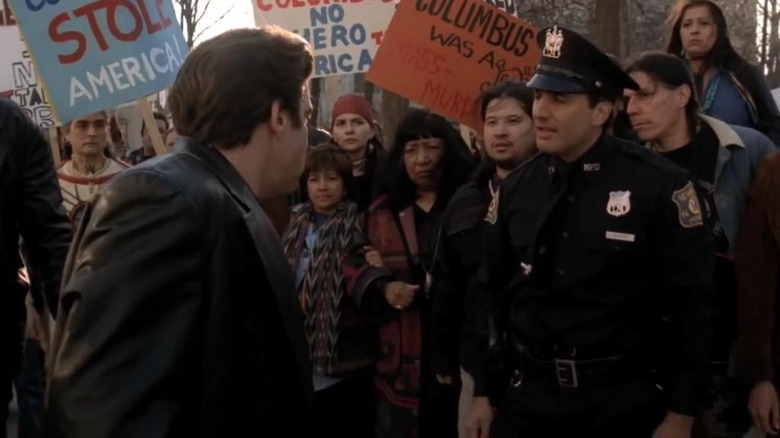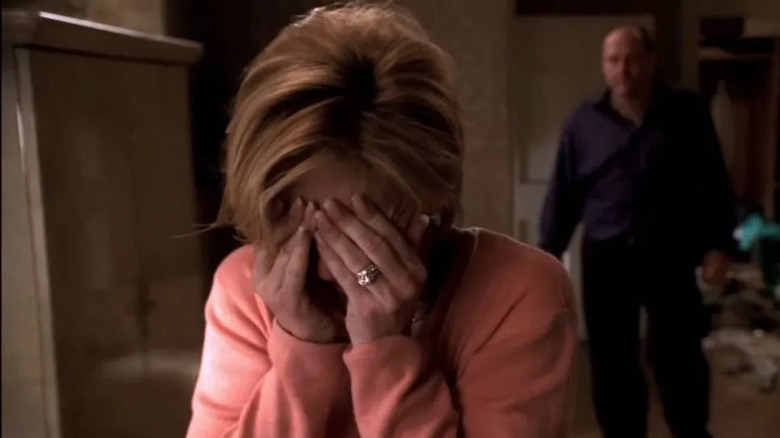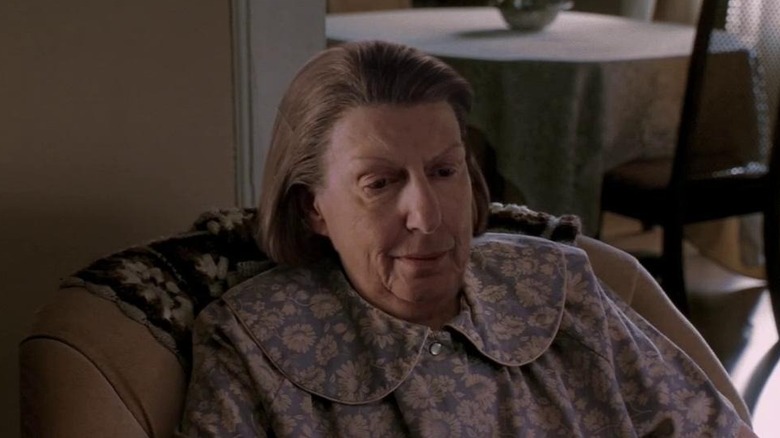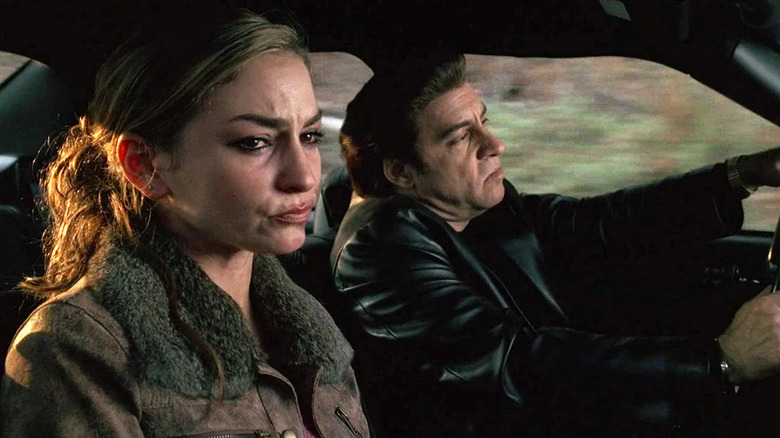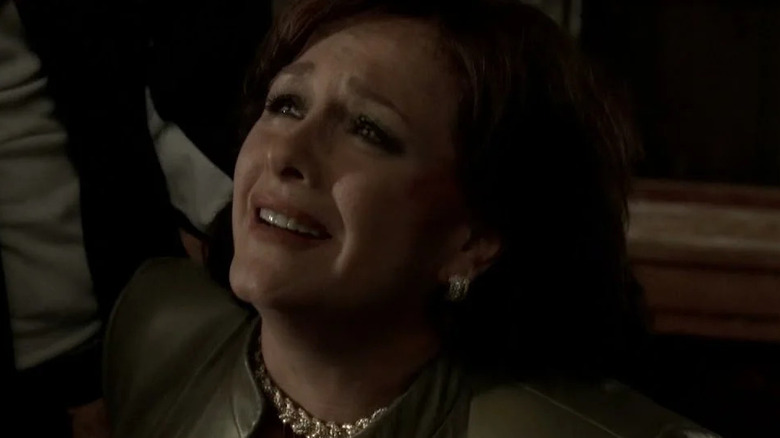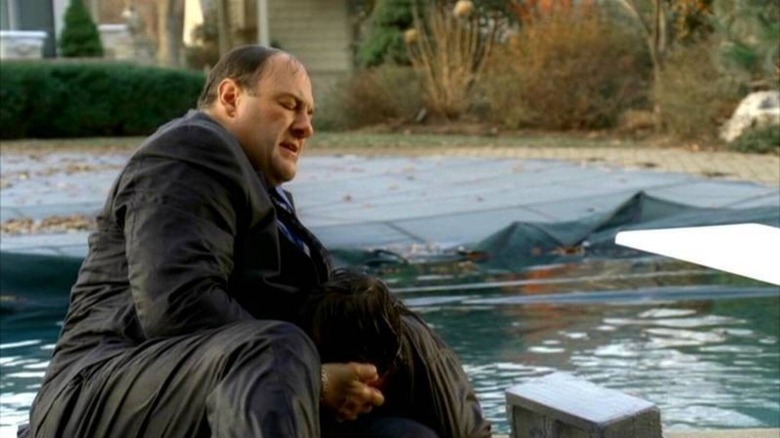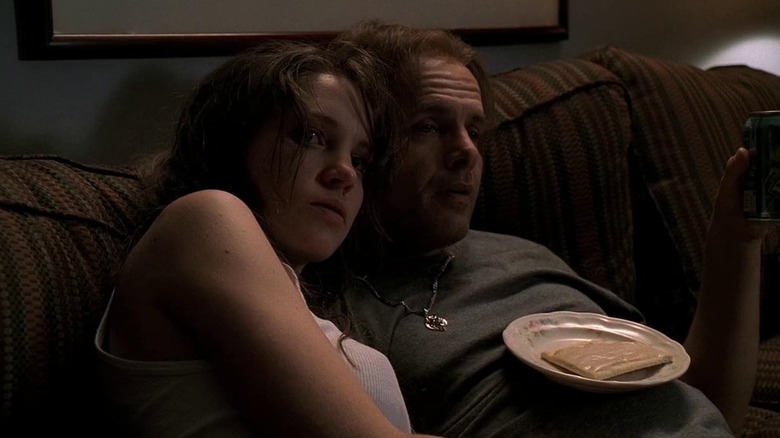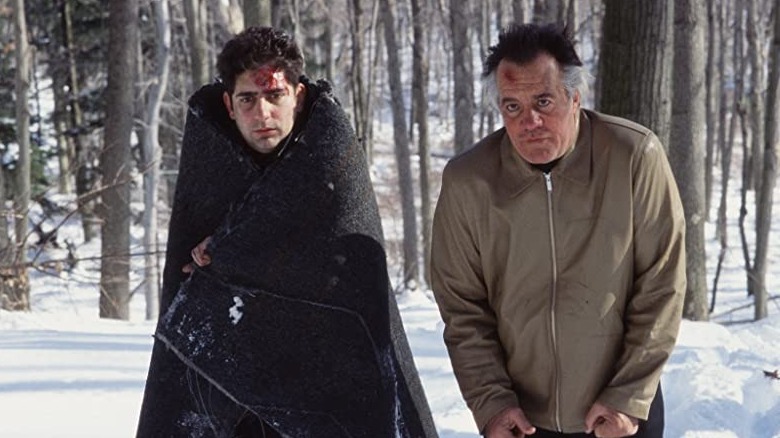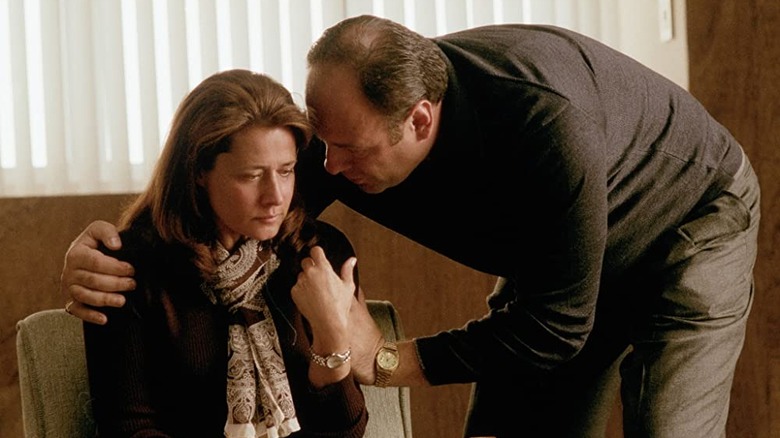The Sopranos' 7 Best And 7 Worst Moments Ranked
We may receive a commission on purchases made from links.
"The Sopranos," the award-winning series created by David Chase, follows mob boss Tony Soprano in his attempts to balance his familial and work responsibilities amid a life-disrupting anxiety disorder that manifests in awful panic attacks. The series begins when Tony turns to therapy, which some folks might argue is also an effort to overcome his repressed guilty conscience.
The series, which helped launch a golden age of prestige TV, boasts an enduring legacy (via The Guardian), and with the wonders of modern-day streaming, it's now managed to capture the hearts of younger generations, too (via The New York Times). And there is, of course, a lot to rave about. After all, when it comes to shows as beloved as this unflinching and darkly comedic crime drama, there are a lot of amazing moments and performances to gush over; Tony and Carmela's big blowout fight in "Whitecaps," Richie's quietly shocking demise in "The Knight in White Satin Armor," Christopher and Paulie's absurd adventure in the snowy "Pine Barrens," and plenty more. That said, all shows stumble from time to time, even "The Sopranos." Obviously not every moment can be great.
All told, the best moments of the show, often bolstered by stunning performances and a perfect balance between drama and comedy, remind us that we're watching a complex serialized narrative. The worst moments, though, largely consist of technical snafus, odd editing choices, ridiculous teen dialogue, and some brutal events that really do go too far.
Spoilers ahead for the entire series of "The Sopranos." Unlike "She-Hulk," we warn you about that sort of thing ahead of time.
Best: The end of Blue Comet
The tension between the mob families has finally boiled over in the series' action-packed penultimate episode "Blue Comet," which features Tony Soprano's very last therapy session with Dr. Melfi, the heartbreaking death of fan-favorite character Bobby, some amazing cinematography, a lot of well-founded panic from our characters, and a notable flashback that arguably foreshadows Tony's ultimate fate.
When "the cousins" botch a preemptive strike against Phil Leotardo, Tony scrambles to get word out to his men that they need to get to the safehouse. Before they can get out of harm's way, Silvio is left in a coma after being shot multiple times outside Bada Bing!, and Bobby's murdered in a hobby shop while purchasing a Blue Comet train model in what critic Alan Sepinwall describes as "a little masterpiece of editing...with the cuts between the hitmen in the security mirror, Bobby studying the...model...the horrified figurines...the terrified real-life patrons...and finally Bobby and the train crashing in unison."
Ultimately, though, it's the agonizing, dread-filled quiet at the end — once the chaos and bloodshed subside — that really resonates here. As Tony lies in bed, gripping the gun Bobby gave him for his birthday, we flashback to the scene from "Sopranos Home Movies" earlier in the season where the two are out on a boat and Bobby says, "You probably don't even hear it when it happens, right?"
It's a haunting, visceral moment that primes us for the show's intentionally ambiguous final scenes, telling us that when it comes to Tony's demise, the uncertainty is the point.
Worst: Carmela's freeze-frame
"The Sopranos" still stuns as a complex, character-driven drama, but even television gems have bad moments. What's interesting about this show, though, is that some of its most noticeable missteps have little to do with the narrative or the characters, and more to do with the editing choices. This is certainly the case in "Cold Cuts," which sees Carmela treating Tony with cold fury and ruminating on the trajectory of her life after he succeeds in sabotaging her chances of obtaining a good divorce lawyer.
But the real problem — and one of the show's worst moments — comes when Carmela runs into her ex-lover, A.J.'s guidance counselor Robert Wegler. As soon as she tells the man she's going back to her husband, we get a strange post-production editing choice. Specifically, we get Carmela walking away in slow motion, followed by a freeze-frame and a screen wipe.
According to The A.V. Club's Emily St. James, this "unfortunate freeze frame, intended to show that Carmela has lost all hope of breaking from her old ways and is once again ensnared by them" is a stain on an otherwise impeccable storyline. And while that's true, it's a freeze-frame that still makes us cringe, with one Redditor even comparing it to a '90s Mentos ad.
It's clear the showrunners wanted to emphasize the narrative significance of this decision, but the result is soap opera-level cheesiness that distracts from the emotional weight of the situation.
Best: Janice shoots Richie
Janice proves she's a true Soprano when she shoots fiancé Richie Aprile — twice — in "The Knight in White Satin Armor." While she spends the better part of this second season urging Richie to usurp her own brother and harboring fantasies about becoming a mob boss' wife, Janice has zero tolerance for domestic violence. Once he punches her after she pushes back against his bitter and homophobic comments regarding his ballroom dancing son, it's clear his time's up. Shaking his head in casual exasperation when Janice holds him at gunpoint, Richie doesn't realize he's summoned that famous Soprano temper until it's too late. Despite her dreams of grandeur, Janice doesn't even hesitate to wipe her abuser off the mafia map. Unbeknownst to her, Tony and Silvio have been planning their own hit on Richie, and we watch the flood of quiet glee on Tony's face when he realizes his sister's taken care of one of his biggest problems for him. It's a thrilling moment that one Redditor declares as one of the most narratively satisfying hits on the show.
The A.V. Club's Emily St. James calls it "somehow fulfilling on a thematic level, on an emotional level...and on a plot level...It single-handedly snaps into place just who Janice is." And she's right. It's a character-defining moment for Janice, one that's bolstered when Livia hears the news and, recognizing something of herself in her daughter, just smirks knowingly and claims she "knew it wouldn't last."
Worst: All the teen dialogue
For many fans, the Soprano kids are the worst characters on the show, and the cringe-worthy dialogue we're treated to during scenes that involve these teens (especially when they're with their friends) certainly doesn't help their cause. In response to one Redditor asking for the "Worst moments in the show that no one talks about," user u/chainsaw_chainsaw references one of the scenes in which the FBI is tailing the family and listening in on A.J.'s conversation with his friends, where we get ridiculous lines like "Yo, A.J., let me get a hit of dat Snapple." According to the user, the dialogue in this moment — in pretty much all the teen-oriented moments — "all just seems so forced, like an old man writing a scene about how he thinks kids act." Several other users vehemently agree. While "The Sopranos" boasts compelling characters and explosive, slow-burning narrative arcs, the writers sometimes fail when it comes to portraying believable, rather than hyperbolic, teen chatter.
Still, it's a testament to the excellent storytelling — and to the actors — that, despite their awful lines and spoiled attitudes, the sheltered A.J. and Meadow manage to evoke sympathy. Many of us feel for the hopelessly depressed A.J. who's doomed to follow in his father's footsteps even though he's clearly not cut out for this life, and many of us found it painful to watch Meadow's transition from outspoken teen to actively complicit young woman.
Best: Ralphie gets whacked
In "Whoever Did This," viewers get to enjoy the satisfying demise of the short-tempered loose cannon Ralph Cifaretto (Joe Pantoliano) via an intense showdown between him and Tony. As a character we all love to hate — who some of the other mobsters despise, too — Ralphie's days as a made man in Tony's crew have always been numbered. Struggling in the aftermath of a freak bow-and-arrow accident that has left his young son severely injured and hospitalized, Ralphie finds himself in desperate need for money. Lucky for him, he's able to claim a hefty insurance check from a stable fire that kills the DiMeo crime family's racehorse, Pie-O-My. Tony, naturally suspecting Ralphie of setting the fire, confronts him while he's at home making eggs. What follows is one of the best scenes of the entire show. As Tony strangles Ralphie, ranting about how the horse never hurt anyone (mirroring Ralphie's earlier words regarding his son), we're reminded, in another character-defining moment, that Tony cares more for animals than he does people, though we'd like to think he's avenging Tracee too.
Also of note: While it's never explicitly stated as to whether or not Ralphie actually slaughters the horse, it's heavily implied. Years later, creator David Chase officially confirmed what we've all long suspected. Ralphie did, indeed, kill Pie-O-My (via Complex).
Worst: Columbus Day
"Christopher," currently ranked as the show's worst episode on IMDb's sorted list, sees Silvio Dante taking on a storyline that's significantly more appropriate for Paulie. Basically, the mobster goes head-to-head with a Native American group planning to protest the upcoming Columbus Day parade. And while we can certainly imagine Paulie flying into a rage over this news, it's hard to accept the main plotline when it's the generally more reserved (though equally terrifying) Silvio spearheading the feud.
But the gist: Members of our Italian-American crime family would prefer to think of Columbus as a celebratory part of their heritage rather than confront the historical figure's role in the genocide and slavery of indigenous people. And so, chaos ensues.
It's clear the production team doesn't agree with our protagonists' takes on this particular controversy. Regardless, "the politics of the episode are inconsistent and often wrongheaded...the dialogue sounds like it was written by an eighth-grader" and the story features the uncomfortable portrayal of Native Americans as either fanatical or corrupt (via Vox).
Worse, this regrettable and frustrating Columbus Day moment overshadows so many other important plot points: Ralphie purchases Pie-O-My, Johnny Sack learns Ralphie insulted his wife (breeding tension between New Jersey and New York), Janice sets her sights on Bobby, and Bobby suffers a shattering loss in what The A.V. Club calls "storyline [that's] raw and deeply felt and real, which stands in marked contrast to most everything else that goes on in the episode."
Best: Tony and Carmela nearly come to blows
For Tony and Carmela, the ending of "The Sopranos" Season 4 is consumed by terrible marital strife. That is to say, Carmela's finally had it with Tony's rampant infidelity. Sure, there's always been some volatility in their relationship, with Carmela struggling with her role as a (complicit) housewife whose husband enjoys the company of various "goomahs" and Tony attempting to contend with work, family, and his own debilitating anxiety. But they've never gone from blissfully content to violently angry as quickly as they do here.
At the start of the episode, they're kissing on the beach after touring a vacation home in Whitecaps. But soon enough, Irina calls, confessing Tony's affairs to Carmela, who reacts by throwing his things out and demanding he leave the house. The tension only grows from there. When it eventually boils over, we're witness to an explosive argument years in the making.
With Emmy award-winning performances by both Edie Falco and the late James Gandolfini (via Los Angeles Times), it's easy to see why Newsweek's Marina Watts declares "Gandolfini...a force to be reckoned with...as his range goes from pretending to be innocent of all infidelity accusations to lunging at Carmela," and why The New Yorker's Lizzie Feidelson gushes over the fact that Carmela's "tears are pure and not at all self-recriminating...it's impossible not to empathize deeply with her." In fact, for Reddit users like u/NoneRighteous, Edie Falco's performance continues to stun even after several re-watches.
Worst: Tony's last conversation with Livia
Tony's final conversation with the manipulative Soprano matriarch who plotted with Uncle Junior to off her own son is another moment that fails not because of the actual narrative, but because of production choices. It's a widely known fact that, after Nancy Marchand sadly passed away, creator David Chase had to scrap the planned arc regarding stolen airline tickets and Livia testifying against her son. Still, Chase was determined to give Tony one final scene with his cruel mother before they wrote her death into the show. And so, in "Proshai, Livushka," the second episode of the third season, we get a body double, Livia's superimposed head, and recycled dialogue and gestures. The cost for all this, by the way: $250,000 (via USA Today).
Ultimately, CBR's Scoot Allan marks this as one of moments in "The Sopranos" that annoyed even dedicated fans. The expensive CG experiment is eerie and unsettling in a bizarre, uncanny valley kind of way that really disrupts the narrative.
Best: Adriana realizes her fate
"Long Term Parking," which CinemaBlend's Doug Norrie considers the best episode of "The Sopranos," offers viewers another powerful and heartbreaking moment, one that comes not long after an intense scene in which Adriana reveals herself as a reluctant rat to Christopher. And though Ade dreams of running away with Chrissy by her side, the devastated mobster who made a blood oath when he joined the family is soon on his way to betray her.
Even without the scene between Christopher and Tony (which we get in the following season), some viewers know Tony's lying when he tells Adriana Christopher tried to hurt himself. But it's the unattainable fantasy of escape — and the quiet drive to her death — that really captures our attention. Her denial, her determination to believe she's going to be okay, slowly melts away, replaced by the terrifying realization that she's trapped in a fatal situation. And while it's true this is one of the most upsetting deaths on "The Sopranos," it's also an incredibly well-acted and narratively pivotal event that emphasizes how these men will always put their crime family ahead of anyone else in their life.
What's more: it's a moment that also seals Christopher's eventual blood-soaked fate. It may be Silvio pulling the trigger here, but Christopher's never able to overcome his struggles with addiction and depression — or heal the widening rift between him and Tony — after losing Adriana. And that, we'd argue, is no coincidence.
Worst: Moments of misogyny and homophobia
In a show about a crime family that features despicable people doing despicable things, we obviously expect a good deal of violence, but there are still moments when "The Sopranos" goes too far. The humiliating and ultra-violent deaths of both Lorraine Calluzzo and Vito Spatafore instantly come to mind here. As awful as Lorraine is, there's something unsavory about the fact that she dies naked and desperate after offering sexual favors in exchange for her life. As discussed in excerpts of Alan Sepinwall and Matt Zoller Seitz's book, "The Sopranos Sessions," we have a bit of spite to thank for Lorraine's particular demise.
Basically, this character — and her death — was David Chase's response to New York Post's Linda Stasi (who, coincidentally, had auditioned for the role) criticizing the fourth season's lack of bloodshed and his reply to the female writer on staff who was pushing for more whacking (via Esquire). Thing is, even when we acknowledge that we're meant to view these often bigoted, sexist, and racist mobsters as monstrous and irredeemable (the villains of their own story), this gleefully gruesome decision feels — at its best — petty, and — at its very worst — intentionally misogynistic. There's particular disdain for homosexuality, too, among the mafia, and while we don't actually see Vito's death, the smug Phil's graphic recollection is more than enough. All told, in both cases, these executions feel like sadistic hate crimes.
Best: Tony pulls a drowning A.J. from the pool
By the end of the series, Meadow and A.J. Soprano are living proof that the generational cycle of violence will continue long after Tony's death. It's difficult — but fascinating — to watch Meadow slowly become as accepting and complicit as her mother about the family's mafia lifestyle and to see the woefully ill-equipped A.J. growing up to be just like his anxiety-ridden father. Regardless of how we feel about the character, ultimately A.J.'s painful spiral into depression and guilt — a direct result of his inability to accept his violent reality or his privilege — leads him to an attempt to end his own life in the backyard pool. Regretting his decision immediately, but unable to free himself from the cinderblock he's tied to his ankle, he can only flail in the water and call for help. Luckily, a mortified Tony sees his son in time and is able to jump in and pull him out of harm's way. Though Tony yells at first, and though the event is initially terrifying, visceral, and gut-wrenching, the moment melts into something more tender.
Robert Iler and James Gandolfini gave two incredible performances here, and in the aftermath of this near tragedy, we're treated to a rare, genuine exchange between an initially enraged but ultimately concerned and devastated father and his very lost and heartbreakingly confused son.
If you or anyone you know is having suicidal thoughts, please call the National Suicide Prevention Lifeline by dialing 988 or by calling 1-800-273-TALK (8255).
Worst: The treatment (and murder) of Tracee
The Season 3 installment, "University" stands as one of the show's most controversial entries due to its treatment of Ralphie's ill-fated lover and Bada Bing! dancer Tracee. While the similarly aged Meadow enjoys college and the privileges of wealth and influence that growing up in a mobster's household has afforded her, the pregnant, financially struggling stripper who's living in squalor, by contrast, has no real lifeline and no opportunities. But when she attempts to ask for help, she's instead terrorized, as the men around her are intent on keeping her in her place. Sure, this is something we'd expect from a crime family full of patriarchal "macho" men, but the narrative arguably takes things too far when Tracee says the wrong thing to Ralphie and he proceeds to brutally beat her to death in the Bada Bing! parking lot. Ultimately, it's one of "The Sopranos"' most brutal moments — one that is, rather than satisfying, quite sickening.
According to New York Post's Austin Smith, this controversial storyline "[comes] across as unusually sleazy and gratuitous, and [makes] for an especially ugly episode, despite the prevalence of similar...scenes in previous...episodes." After the episode aired, some viewers, utterly disgusted with the content, even canceled their HBO subscriptions (via Pittsburgh Post-Gazette). What makes it all even more uncomfortable and disquieting: The thing Ralphie eventually has to apologize for is not the coldblooded slaughter of an innocent woman but disrespecting the establishment that serves as their front.
Best: Paulie and Christopher get lost in the woods
Directed by Steve Buscemi, "Pine Barrens" — the 11th installment of the show's third season — is black comedy gold. In this bottle episode that's currently ranked as the show's very best on IMDb's sorted list, Paulie and Christopher endure a tumultuous experience that really captures the dramatic and comedic spirit of "The Sopranos."
After a collection gone wrong, the two mobsters drive out to the snowy Pine Barrens, intent on using this conveniently remote place to dispose of the Russian — an interior decorator! — they've shoved into the trunk of their car. Of course, this plan goes off the rails, too, and it's not long before the Russian has escaped into the wilderness and the two men are contending with a broken-down vehicle, freezing their butts off, and resorting to eating Tic Tacs and packets of sauces for sustenance. Eventually, they figure out how to work together.
According to Collider's Liam Gaughan, "The brilliance of [the entry] comes from the fact that Christopher and Paulie's detour mirrors the narrative arc of the series, elevating what seems like a B-plot into the dominant storyline of the episode." In short, this exceptionally engaging plot thread — which boasts the perfect balance of dark comedy and character-driven drama — is, in its entirety, an amazing moment for the series. In fact, it might be the show's very best moment.
Worst: Dr. Melfi's assault
"Employee of the Month" sees the violent sexual assault of Tony's therapist, Jennifer Melfi. Alone in a parking garage stairwell, Dr. Melfi's thrown into an agonizing nightmare — beaten and violated by a stranger. The event is extremely jarring and tough to watch to the point where many Redditors, including user u/njb8201, confess to skipping the episode entirely during their re-watches because of the uncomfortably violent and unflinching depiction of Dr. Melfi's trauma. According to The Sun Chronicle, this plotline "made some viewers wonder if this series so known for its violence and its startling twists had finally gone too far."
And though this event leads to another extremely significant and character-defining moment — in which Melfi keeps to her own ethics and refuses to ask for help from her mob boss patient — the assault remains brutal and triggering in a way that some might say is completely unnecessary. That is to say, there's no reason this needed the screen time it got. The point is made as soon as we see the guy attack. What follows is a lot of victim-blaming, and Melfi's own fantasy of telling Tony, but it's notable that she refuses herself this temporary pleasure for the sake of her soul, protecting herself from what she perceives as irredeemable corruption.
If you or anyone you know has been a victim of sexual assault, help is available. Visit the Rape, Abuse & Incest National Network website or contact RAINN's National Helpline at 1-800-656-HOPE (4673).
